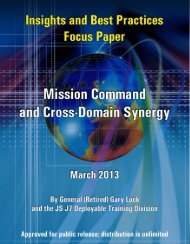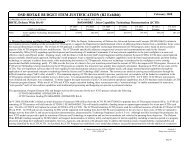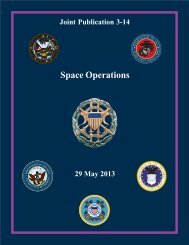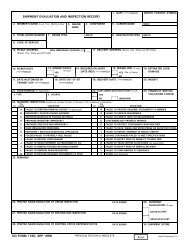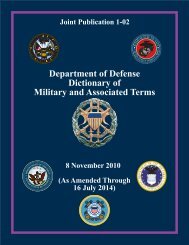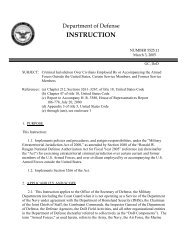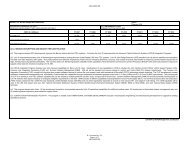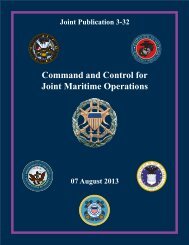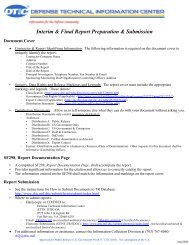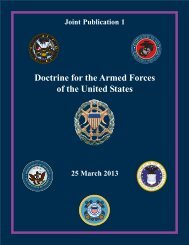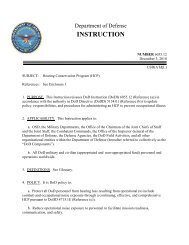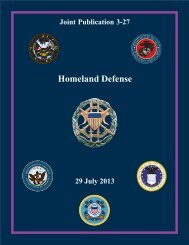JP 3-16, Multinational Operations - Defense Technical Information ...
JP 3-16, Multinational Operations - Defense Technical Information ...
JP 3-16, Multinational Operations - Defense Technical Information ...
Create successful ePaper yourself
Turn your PDF publications into a flip-book with our unique Google optimized e-Paper software.
Planning and Execution Considerations<br />
(b) The multinational IO plan should directly and demonstrably support the<br />
objectives of the MNFC. This is particularly important when joint force planners are<br />
attempting to acquaint a non-US MNFC with the advantages of IO as a part of military<br />
strategy.<br />
(c) The subordinate JFC may undertake planning and execution of independent<br />
IO in support of multinational objectives.<br />
See CJCSI 6510.01, <strong>Information</strong> Assurance (IA) and Support to Computer Network <strong>Defense</strong><br />
(CND).<br />
(4) Military information support operations (MISO) provides the commander with<br />
the ability to convey selected information and indicators to foreign audiences to influence<br />
their emotions, motives, objective reasoning, and ultimately the behavior of foreign<br />
governments, organizations, groups, and individuals. The purpose of MISO is to induce or<br />
reinforce foreign attitudes and behavior favorable to the originator’s objectives. MISO<br />
should be incorporated into all multinational operations. The MNFC should ensure that all<br />
MISO, regardless of national origin, are coordinated. MISO planning must begin early,<br />
preferably before deployment, to prepare a population for the arrival of MNFs and develop<br />
communication channels that can be used from day one of the operation. A detailed analysis<br />
of a country’s culture, political climate, and military organization can help the MNFC to<br />
effectively apply MISO to communicate policy, provide information, and persuade groups to<br />
cooperate with friendly forces. US MISO are approved in US channels regardless of the<br />
composition of the MNF chain of command. Many NATO and Partnership for Peace nations<br />
still use the term psychological operations.<br />
See <strong>JP</strong> 3-13.2, Military <strong>Information</strong> Support <strong>Operations</strong>, for additional information.<br />
f. Cyberspace <strong>Operations</strong><br />
(1) Cyberspace is a global domain within the information environment consisting<br />
of the interdependent network of information technology infrastructures and resident data,<br />
including the Internet, telecommunications networks, computer systems, space-based<br />
resources, and embedded processors and controllers. Cyberspace uses electronics and the<br />
electromagnetic spectrum to create, store, modify, and exchange data via networked systems.<br />
Cyberspace operations is the employment of cyberspace capabilities where the primary<br />
purpose is to achieve objectives in or through cyberspace.<br />
(2) Nations’ understanding of the role of cyberspace in military operations<br />
continues to evolve. Operating capabilities, philosophies, and national limitations on<br />
cyberspace activities in support of military operations are changing at a tempo that affects<br />
ongoing MNF operations as well as the planning of potential future ones. Mutually<br />
beneficial national interests usually govern a contributing nation’s involvement in MNF<br />
cyberspace operations. The level of multinational network and other cyberspace operations<br />
integration is directly influenced by the partnerships or agreements made with contributing<br />
nations.<br />
III-31



